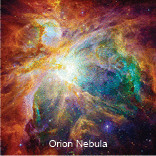![]()
The realm in which God dwells is amazingly beyond our comprehension. While we cannot fathom the vastness of the universe, it is a mere creation of his, and time a mere dimension of that universe. Amazingly, we live in this era in which science has determined the relativity of time, even as it relates to the physical realm. Through Isaiah (55:9, NIV 1984) he informed us, “As the heavens are higher than the earth, so are my ways higher than your ways and my thoughts than your thoughts.” Peter tells us, “With the Lord a day is like a thousand years, and a thousand years is like a day” (2 Peter 3:8).
Let me share some Scripture verses which show that activities rightfully ascribed to God are accomplished by processes he has set in place. I believe that God has intervened and can intervene by miracles, but I suspect that they will never occur where human science can prove them.
 Does God bring out the starry host and call them each by name as written in Isaiah 40:26? In Job 38:31, 32 God says, “Can you bind the beautiful Pleiades? Can you loose the cords of Orion? Can you bring forth the constellations in their seasons or lead out the Bear with its cubs?” Science has unveiled amazing processes at work in the cosmos that explain the movements of galaxies, stars, and planets. When scientists uncovered the heliocentric nature of our solar system, some people proposed that angels were guiding planets in perfect circular orbits around the sun. However, natural processes account for the not quite so perfect orbits of the planets.
Does God bring out the starry host and call them each by name as written in Isaiah 40:26? In Job 38:31, 32 God says, “Can you bind the beautiful Pleiades? Can you loose the cords of Orion? Can you bring forth the constellations in their seasons or lead out the Bear with its cubs?” Science has unveiled amazing processes at work in the cosmos that explain the movements of galaxies, stars, and planets. When scientists uncovered the heliocentric nature of our solar system, some people proposed that angels were guiding planets in perfect circular orbits around the sun. However, natural processes account for the not quite so perfect orbits of the planets.
Does God cause the dawn? The implications of Job 38:12 are that he gives orders to the morning and shows the dawn its place. Verse 14 continues the thought, “The earth takes shape like clay under a seal.” The light of dawn allows us to see landscape details compared in this verse to the intricate details left in soft clay by the impress of a signet-ring. However, it is scientifically accurate and reasonable to speak of the dawning as a natural event of earth’s rotation.
Does God send the sunshine and the rain? Matthew 5:45 says that he causes the sun to rise and sends the rain. Amos 5:8 adds a detail of the hydrological cycle with the words, “He who calls forth the waters of the sea and pours them out over the face of the land.” Since science has discovered a great deal of information about the processes involved in sunshine and rain events, some think that God has been explained out of those events.
 Does God cause plants to grow? Paul attributes their growth to God with these words from 1 Corinthians 3:7, “So neither he who plants nor he who waters is anything, but only God who makes things grow.” An enormous mass of information has been assembled about DNA, photosynthesis, and thousands of processes at work in the growth of living organisms.
Does God cause plants to grow? Paul attributes their growth to God with these words from 1 Corinthians 3:7, “So neither he who plants nor he who waters is anything, but only God who makes things grow.” An enormous mass of information has been assembled about DNA, photosynthesis, and thousands of processes at work in the growth of living organisms.
A person equipped with ability, training, and access to scientific literature can write books about any of these natural processes. They are complex, intricate, and fascinating. But what do they reveal about God’s existence and involvement in their functioning? Of course, science delves into an unending array of questions about how things function. It also addresses many why-questions about natural entities and events. However, many why-questions find no answer from scientists and their tools.
With human inquisitiveness, we rightfully seek answers to questions that science is not equipped to answer. Why does the universe contain the water molecule with its broad array of amazing characteristics? Why is there a thing called light that combines particle and wave characteristics and can be dispersed into a rainbow? Why do we think rainbows are beautiful? In The Hidden Face of God, Gerald Schroeder writes, “The mystery that remains in the sunset is the riddle of why and how a mixture of carbon, hydrogen, oxygen, and several other varieties can produce humans capable of having a subjective experience we refer to as beauty, or the love that would have us kiss our kids good night. Science is no closer to answering those questions than it was a century ago.”
We can, as humans should, step back from the tools of science and attempt to grasp the magnificence. We possess the power to feel the breeze, to hear the cardinal, to stare into the fog, to smell the bacon, to taste the raspberries, and to experience the emotions that arise as these events impact our central nervous system. Even those who claim that science holds all the answers live lives filled daily with subjective experiences.
Some imagine that the understanding of natural processes has undermined the necessity for belief in God. They reason that so much has been brought to light that there is no longer a need for a God-explanation of events. However, at the same time that innumerable little things have been discovered, the big picture has taken on immense complexity. The universe is no longer perceived as having the simplicity that caused Ernst Haeckel to write in 1899, “With this single argument the mystery of the universe is explained, the deity annulled, and a new era of infinite knowledge ushered in.” Knowledge is not on track to be infinite, to annul deity, or to explain the mystery of the universe.
More than ever, we need an adequate explanation. The poet, James Russell Lowell, captured the essence of God’s relationship to the created world with the words, “behind the dim unknown standeth God within the shadow, keeping watch above his own.”
Any question concerning whether or not God exists will not be resolved by the scientific method. Those tools and discoveries do not offer a scientific proof of the existence of God. They do make a significant addition to an apologetic argument for God’s existence.
So universally believers accept God’s use of process in days and seasons, in rain and sunshine, and in plant growth and bringing out the constellations. However, because of the influence of a few teachers, many refuse to accept that process could be involved in the acts of God referred to in Genesis chapter one. In that chapter, a “literal” interpretation is often demanded. The obvious figurative parallelism in the construction of that chapter is ignored.
 Whatever becomes evident through scientific discovery concerning the origin of the universe and the biosphere will not conflict with the great message of God to humanity in Genesis. All the information gleaned by scientists about the growth of living organisms does not violate the decree that God causes the growth. That is true of the other processes God has established in nature, including those revealed in Genesis. God set natural processes in motion, and the Bible rightfully attributes those activities to their Maker.
Whatever becomes evident through scientific discovery concerning the origin of the universe and the biosphere will not conflict with the great message of God to humanity in Genesis. All the information gleaned by scientists about the growth of living organisms does not violate the decree that God causes the growth. That is true of the other processes God has established in nature, including those revealed in Genesis. God set natural processes in motion, and the Bible rightfully attributes those activities to their Maker.
A human-invented hermeneutic that demands the elimination of process from Genesis 1 and conflicts with science is not somehow intrinsically demanded. To accept that interpretation does not somehow make us better believers and more faithful to God. It is just another human interpretation that tries to make God fit our limited understanding of what it means to be God. If we let God be God, he can use process to accomplish his purpose without it diminishing our faith.
Picture credits:
© Creativemarc. Image from BigStockPhoto.com.
© aluxum. Image from BigStockPhoto.com.
© Fyletto. Image from BigStockPhoto.com.
